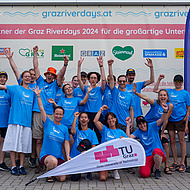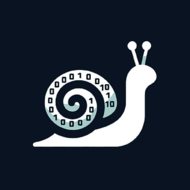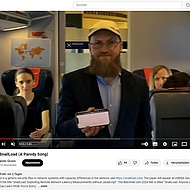
02.07.2025
TU Graz launches ‘prompting.school’
The learning platform offers interactive online courses for the effective use of generative AI. The offer is open to everyone and free. "In addition to a basic understanding of generative AI, we want to teach users how to prompt well and effectively," says Benedikt Brünner from the Institute of Human Centred Computing.

25.04.2025
On 3sat: Wolfgang Slany and his research on the intelligence of octopuses
A NANO episode (from minute 9:46) of 3sat shows research into the intelligence of octopuses using AI and augmented reality: Wolfgang Slany (Institute of Software Engineering and Artificial Intelligence) and his team want to explore the intelligence potential of octopuses by bringing them into contact with humans and machines.
A Citizen Science Project has recently been launched in which amateurs can support the research: Film or photograph the octopuses and their artificial caves on your next dive or snorkeling trip near the island of Krk! Find out more about the Octopus Den initiative!
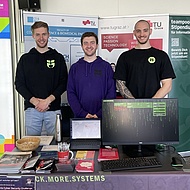
09.04.2025
LosFuzzys go HTL Grieskirchen
On Friday, 4 April 2025, HTL Grieskirchen became a meeting point for numerous educational institutions and companies. Among the exhibitors was the LosFuzzys student team: Sebastian, Simon and Alexander, who provided interested students with insights into their team and the computer science degree programs at TU Graz.
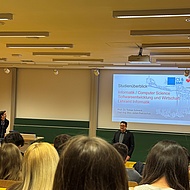
20.03.2025
Hands-On Experience at TU Graz: A Visit from Europagymnasium Klagenfurt
On March 18th, 50 students from Europagymnasium Klagenfurt visited our department at Inffeldgasse. After a presentation by Tobias Schreck and Julian Rakuschek on degree programs and student life at TU Graz, the students explored the MINKT lab and IVC Institute. They participated in hands-on activities, including playing the piano with AI, a multidimensional card game, and machine maintenance using VR glasses.
Interested in a school visit at TU Graz? Our ‘Invite A Prof.’ programme gives pupils a first-hand insight into the university.
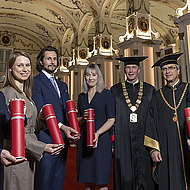
18.03.2025
Sub-Auspiciis Doctorates for Researchers at TU Graz
This year, three researchers from our faculty CSBME are receiving their doctorates “sub auspiciis Praesidentis rei publicae” (i.e. under the auspices of the President of the Republic): Barbara Gigerl, Andrea Pferscher and Reinhard Lüftenegger. Congratulations!
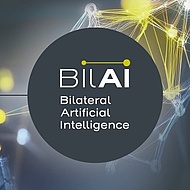
27.02.2025
Bilateral AI - A new level of artificial intelligence
In the FWF Cluster Bilateral AI, top AI scientists from JKU, TU Wien, WU Wien, TU Graz, the University of Klagenfurt and the Institute of Science and Technology Austria (ISTA) are working on a new level of AI, a so-called ‘Broad AI’, which should have significantly better and broader problem-solving capabilities than ChatGPT, for example. The kick-off took place yesterday at the JKU.
A monthly newsletter will offer exclusive insights into the latest developments, events and career opportunities around Bilateral AI. Sign up now and stay up to date: Subscribe for news https://www.bilateral-ai.net/contact/newsletter
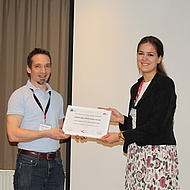
17.02.2025
CVWW 2025: CSBME Best Presentation Award goes to Jovana Videnović (University of Ljubljana)
Ms. Jovana Videnović (University of Ljubljana) received the CSBME Best Presentation Award at the 28th Computer Vision Winter Workshop (CVWW) for her outstanding research work. Congratulations!
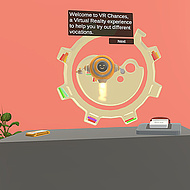
13.02.2025
Interactive Career Guidance via VR Glasses
Together with Jugend am Werk Steiermark, the Game Lab Graz at TU Graz has developed a VR application in which young people can get to know various apprenticeships better. “The interactivity of the VR environment enables young people to become active themselves and thus get a better picture of what an occupation involves,” says Michael Holly (Institute of Human-Centred Computing).

13.02.2025
Honours to Gerhard A. Holzapfel (BioMech)
Gerhard A. Holzapfel (Institute of Biomechanics) has recently received three honours:
- EUROMECH Prize for Solid Mechanics 2025: For pioneering transformative and seminal advances in the mathematical and computational biomechanical modelling of the nonlinear solid mechanics of several soft biological tissues, especially artery and heart tissues.
- International Member of the National Academy of Engineering of the United States (NAE)
- Honorary doctorate in mechanical engineering from the University of Parma, Italy
Congratulations!
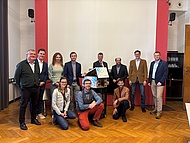
30.01.2025
An MRI Scanner in the Rector's Office?
The Faculty of Computer Science and Biomedical Engineering (CSBME) had the pleasure of presenting a special gift to Rector Horst Bischof - a fully functional MRI scanner. This unique addition now joins his collection of representative objects from the seven faculties of TU Graz.

Two new institutes at CSBME
As part of our new faculty structure from January 2025, we are pleased to announce the founding of two new institutes at the Faculty of Computer Science and Biomedical Engineering: Institute of Visual Computing (IVC) and Institute of Algorithms and Theory (ATCS). A introduction to the two institutes can be found here.
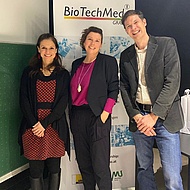
New directors of BioTechMed-Graz
The new directors of BioTechMed-Graz have been announced: Christine Moissl-Eichinger (Medizinische Universität Graz), Martina Schweiger (Uni Graz) and Thomas Pock (TU Graz).
What is BioTechMed-Graz?
As a research cooperation between the University of Graz, Graz University of Technology and the Medical University of Graz, BioTechMed-Graz strengthens cutting-edge research, cooperation and networking at the research location of Graz. The support of young scientists, the promotion of excellent research projects and the joint acquisition of research infrastructure are among the most important goals of the research co-operation.
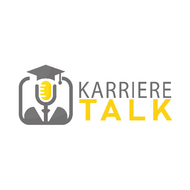
New podcast "KarriereTalk" by CSBME students
Patrick Krumpl, who is studying ‘Information and Computer Engineering’ at TU Graz, has founded a podcast together with other students from the Circle of Excellence Graz: In "Karriere Talk", students take a look behind the scenes of exciting career paths, talk about challenges and successes and pass on tips from successful and inspiring personalities. Jens Poggenburg (AVL), Stefan Rohringer (Infineon), Christina Hirschl (Silicon Austria Labs) and Lisa Reisenhofer (Beyond Now), among others, have already been guests on the podcast.
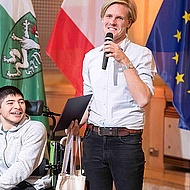
Mind the Gap Award 2024 goes to Thomas Moder (ISDS)
The 2024 Mind the Gap Award honors Thomas Moder's master's thesis on AI-based voice cloning for people with severe speech impairments. His approach generates authentic voices from minimal input, enhancing social participation and self-expression. The work exemplifies how AI can break language barriers and foster inclusion.

New structure of the departmant of Computer Science and Biomedical Engineering
The new structure of the departmant of Computer Science and Biomedical Engineering has been approved by the university council: For a unified appearance, all institutes will have an English name to increase international visibility. In addition, two new institute will be founded.
The structure of our department from 1 January 2025:
7050 - Institute of Information Security (ISEC)
7060 - Institute of Human-Centred Computing (HCC)
7080 - Institute of Machine Learning and Neural Computation (IML)
7090 - Institute of Neural Engineering (INE)
7100 - Institute of Visual Computing (IVC)
7160 - Institute of Software Engineering and Artificial Intelligence (SAI)
7170 - Institute of Biomedical Imaging (IBI)
7180 - Institute of Health Care Engineering (HCE)
7190 - Institute of Biomechanics (Biomech)
7200 - Institute of Biomedical Informatics (Bioinfo)
7210 - Institute of Algorithms and Theory (ATCS)
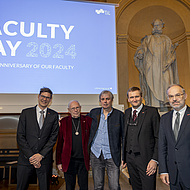
Faculty Day 2024 - 20 years of the Faculty of Computer Science and Biomedical Engineering
The Faculty Day 2024 marked two decades of achievements in computer science and biomedical engineering at TU Graz. This milestone event combined insightful research presentations, reflections on the faculty’s journey, and recognition of exceptional academic and teaching accomplishments.
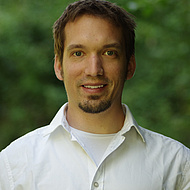
Vienna’s Smart Traffic Lights Are Now Getting Even Smarter
Since 2018, Vienna has used 21 intelligent traffic lights that detect pedestrians approaching a crossing and automatically request green, significantly reducing waiting times. Now, a team led by Horst Possegger from the Institute of Computer Graphics and Vision has developed and successfully tested a second generation of these lights at four Vienna crossings. With enhanced camera resolution, increased computing power, and a deep learning-based model, the new system can identify people with mobility aids or strollers and manage multiple crossings simultaneously.

ERC Synergy Grant Awarded to Gerhard Holzapfel for Advancing Non-Invasive Imaging of Human Tissue Microstructure and Mechanics
Gerhard A. Holzapfel from the Institute of Biomechanics has been awarded an ERC Synergy Grant. Together with the Helmholtz Centre Hereon and ETH Zurich, he and his team will develop an imaging method for the non-invasive determination of the microstructure and mechanical properties of human tissue. The aim is to improve the diagnosis and treatment of numerous diseases, such as diastolic heart failure. The European Research Council is funding the six-year research project with a total of 10 million euros, of which around 4.2 million will go to the Institute of Biomechanics.

Apply now: OverSEAS programme
Have you ever heard of the OverSEAs programme? Study one or two semesters at one of the partner universities worldwide (the Americas, Asia, UK). All information about the benefits and the process can be found here.
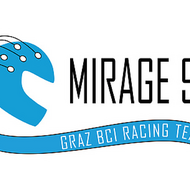
Mirage 91: The Graz BCI Racing Team at the Cybathlon 2024 in Zurich
The Cybathlon 2024 took place from 25 - 27 October 2024 at ETH Zurich. Teams from universities, companies and NGOs competed in various disciplines in which they demonstrated the performance of technical assistance systems for people with disabilities. The student team Mirage 91 represented TU Graz and took sixth place in the Brain Computer Interfaces discipline.
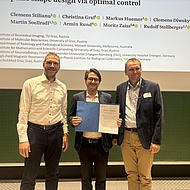
ÖGBMT Annual Meeting 2024
From 24 October to 25 October 2024, the ÖGBMT Annual Meeting 2024 brought together experts, researchers and industry leaders to explore the latest breakthroughs, discuss emerging trends and address the key challenges shaping the future of biomedical engineering. In addition to workshops, research talks and poster presentations, the Stefan Schuy Prize was awarded to Clemens Stilianu.
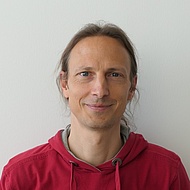
Roman Kern (ISDS) in the Kronen Zeitung about fake calls
Kronen Zeitung discussed scam calls with cloned voices and spoke to Roman Kern from the Institute of Interactive Systems and Data Science. According to Roman Kern, with about twelve seconds of a voice, you can already credibly pretend that it is another person, as several online services now make it easy to clone voices with the help of AI.
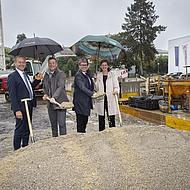
Ceremonial start of construction of the Cybersecurity Campus Graz
The Cybersecurity Campus will provide TU Graz with its own internationally competitive location for its top research focus on cyber security. On Friday, September 27, Federal Minister of Science Martin Polaschek, State Councillor Barbara Eibinger-Miedl, TU Graz Rector Horst Bischof and Gerald Beck, Managing Director of Bundesimmobiliengesellschaft, celebrated the start of construction with a ground-breaking ceremony. The ultra-modern and climate-friendly research center with its wood and glass façade is scheduled to be opened in spring 2026.

Better MRI Videos Thanks to New Machine Learning Method
An international research team led by Martin Uecker and Moritz Blumenthal from the Institute of Biomedical Imaging has now succeeded in generating precise live MRI images of the beating heart even without such training images and with very little MRI data with the help of smartly trained neural networks. Thanks to these improvements, real-time MRI could be used more frequently in practice in the future.
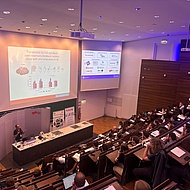
9th Graz Brain-Computer Interface Conference: Platform for international exchange and scientific progress
The 9th Graz BCI Conference took place from September 9-12 and brought together researchers from more than 22 countries to discuss the latest BCI developments.

ERC Starting Grants for Fariba Karimi
There is evidence that the use of artificial intelligence in online social networks – for example in recommendations and timelines on platforms such as LinkedIn or Google Scholar – leads to discrimination and increases social inequality. Fariba Karimi from the Institute of Interactive Systems and Data Science wants to get to the bottom of these trends in her project NetFair – Network Fairness and develop methods to analyse and eliminate these new mechanisms of inequality and discrimination.
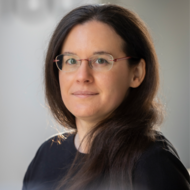
ERC Starting Grant goes to Maria Eichlseder
Maria Eichlseder’s ERC Starting Grant is the third to be awarded to researchers from the Institute of Applied Information Processing and Communications at TU Graz since 2016. Her project – KEYLESS – deals with encryption, but without the eponymous key. The focus is on the core component of cryptographic systems, the so-called primitive, which is responsible for the security of the entire system.
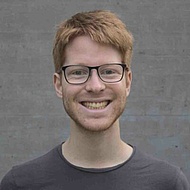
Numerous Manufacturers Use Insecure Android Kernel
In an analysis of smartphones of ten manufacturers, Lukas Maar, Florian Draschbacher, Lukas Lamster und Stefan Mangard from IAIK have found that the Android kernels used are vulnerable to known attacks – so-called one-day exploits – despite existing protection mechanisms. “We hope that our results will help to ensure that more effective security measures can be found in manufacturers’ kernels in the future, making Android more secure,” says Lukas Maar.
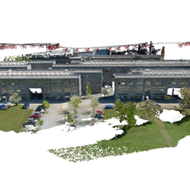
Die Presse: How to train drones to see
Amazon wants to start making deliveries by drone. Reason enough for the daily newspaper Die Presse to take a look at how this topic is being researched in Austria: Friedrich Fraundorfer at the Institute of Computer Graphics and Vision is researching how to improve the drones' ability to recognize their surroundings.
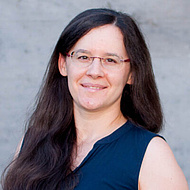
Maria Eichlseder about encryption of WhatsApp and Co.
In the Kleine Zeitung and the Neue Vorarlberger Tageszeitung, Maria Eichlseder from the Institute for Applied Information Processing and Communications explains how secure private chats are and what possibilities criminals, as well as state authorities, have to intercept message content.
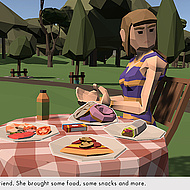
„Tiny Biome Tales“: A game about human microbiome
Researchers from the Institute of Environmental Biotechnology, together with Johanna Pirker, Florian Marcher and Maximilian Wlasak from Game Lab Graz, have developed a computer game on the health significance of the human microbiome. Play the game: https://microbiome.gamelabgraz.at/
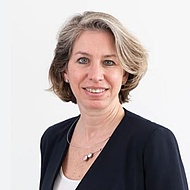
Angela Fessl (ISDS): AI in schools and universitites
wienerzeitung.at asked Angela Fessl (Institute of Interactive Systems and Data Science) how schools and universities should prepare their students for a working world in which AI is playing an increasingly important role. She pointed out that with the emergence of ChatGPT, there should have been a rapid adaptation of curricula - on the one hand to build up basic knowledge and expertise, and on the other hand to learn an awareness of the correct use of AI.
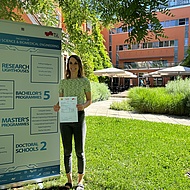
Navigating the Interdisciplinary Path: Sabrina Pletzl's Journey in Computational Social Systems
Sabrina Pletzl recently completed her Master's degree in Computational Social Systems. In this interview, she explains why she chose CSS and how she benefited from it.

ORF: Roman Kern (ISDS) talks about context windows in AI applications
The news program ZIB on ORF 2 reported on google's improved AI model Gemini, which can capture text content of around 2000 pages at once. Roman Kern from the Institute for Interactive Systems and Data Science was interviewed: “A large context window has many advantages, but this does not necessarily mean that the quality of the answers will be better.”

CSBME Summer Party 2024
After the award ceremony of the silver diplomas to telematics graduates and the HabilTalk by Yannic Maus, employees of our faculty enjoyed the summer party with a delicious barbecue buffet and live music.
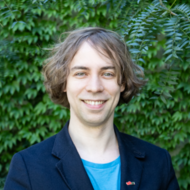
Daniel Gruss promoted to full professor
Two years after taking up the position as associate professor, we’re happy to announce Daniel Gruss (IAIK) has been promoted to full professor as of July 1st 2024! In his research, he explores software-based microarchitectural attacks and operating system features. In the last two years, his focus extended to include the foundations of sustainable security and how we can improve efficiency while maintaining security. Thank you for being part of our department, and Congratulations!
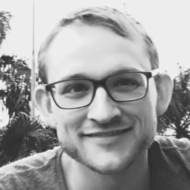
Newly appointed Professor of Foundations of Computer Science: Yannic Maus
Yannic Maus was promoted to Professor of Foundations of Computer Science on July 1, 2024. In his research he deals with problems in theoretical computer science and algorithm design, in particular problems arising in the context of distributed computing. Thank you for being part of our department, and Congratulations!
CSBME @ 5th Dragon Boat University Cup
The 5th Dragon Boat University Cup took place as part of the "Graz Riverdays" on 22.06.2024. TU Graz was represented by 6 teams this year. In perfect weather, 18 CSBME employees paddled on the Mur and brought the dragon boat safely to the finish line! Many thanks to all participants!
New Security Loophole Allows Spying on Internet Users Visiting Websites and Watching Videos
Online activities can be monitored in detail simply by analysing latency fluctuations in the internet connection, researchers at Graz University of Technology have discovered. The attack works without malicious code or access to the data traffic. The team led by Stefan Gast and Daniel Gruss (both IAIK) has set up a website describing SnailLoad in detail.
If you would like a musical explanation of the security gap, the researchers have added the appropriate lyrics to the winning song of this year's song contest and made a music video: https://www.youtube.com/watch?v=oQpbSbeAJ2I
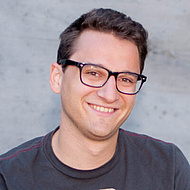
Heinz Zemanek Prize 2024 goes to Martin Schwarzl (IAIK)
The Austrian Computer Society (OCG) has honored this year's Heinz Zemanek Award winners for outstanding dissertations in the field of computer science. In addition to Lukas Burgholzer from the JKU Linz, Martin Schwarzl from the Institute of Applied Information Processing and Communications received the award for his dissertation on remote side-channel attacks and their prevention.
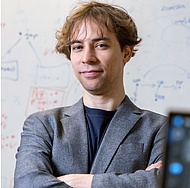
Daniel Gruß warns of security risks with planned monitoring of messenger services
This week, the Belgian EU Council Presidency is seeking a decision on the monitoring of messenger services. Experts, including Daniel Gruss (IAIK), warn of the considerable security risks posed by client-side scanning, which is intended to check messages for illegal content before they are sent and encrypted. Read the whole article on derstandard.at

How can AI speak for the mute, Thomas Moder?
During his community service, Thomas Moder met a young person who is unable to speak due to a disability. As part of his master's thesis under the supervision of Roman Kern at the Institute of Interactive Systems and Data Science, he researched how he could help these people to speak with their own voice. Servus TV visited him and took a look at how Thomas Moder clones people's voices, even with little data, for the program TM Wissen.
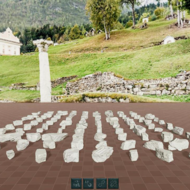
Open Reassembly in the Science Blog “Schrödingers Katze”
The Austrian science blog “Schrödinger's Cat” has published a report on the joint project between Graz University of Technology and the University of Graz, for which the fragments of the altar slab from the early Christian bishop's church at Lavanter Kirchbichl have been digitized so that interested amateur archaeologists can help reassemble them on an online platform.

New: Human-Centered Computing Labs in the Data House
Equipped with state-of-the-art technology, the new laboratory spaces offer the opportunity for interdisciplinary research at the interface between man and machine.
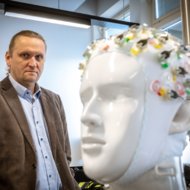
Das „Locked-in-Syndrom“ on Ö1
On the Ö1 program “Am Puls - Gesundheit und Medizin” one of the topics was locked-in syndrome. Katharina Posch has been paralyzed all over her body since a tumor operation and can only move her left eye. Using artificial intelligence, Gernot Müller-Putz and his team at the Institute of Neurotechnology have cloned her voice.

Implanted computer chips & environmentally friendly surfactants
The program "Terra Mater Wissen" (Servus TV) featured a report on brain implants and visited Gernot Müller-Putz from the Institute of Neurotechnology. His research group is working on a chip that is applied directly to the brain under the skull to record brain signals with high accuracy and transmit them wirelessly to a computer, where the signals are translated, for example by a speech computer.
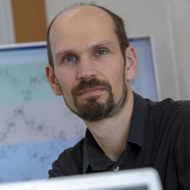
Austrian Science Fund ‘Cluster of Excellence’ Funding for “Bilateral AI”
The research project "Bilateral AI" was awarded the FWF Cluster of Excellence (CoE). "With six top-class scientists from the fields of symbolic and sub-symbolic AI, Graz University of Technology is making a significant contribution to the research work of the Cluster of Excellence," explains Robert Legenstein, Head of Institute of Theoretical Computer Science (IGI) at Graz University of Technology.

Online puzzle to solve mystery of ancient slab
In the computer game "Open Reassembly" from TU Graz and the University of Graz, users can put together almost 100 fragments of an ancient marble slab. Archaeologists have not yet succeeded in putting them in order, but now users are to do so.

The future of brain-computer interfaces in medicine
The journal nature medicine reports growing interest in non-invasive brain-computer interfaces (BCI), which could be used by paralyzed patients to move prostheses, for example. For the article, the author spoke to Gernot Müller-Putz (Dean of Faculty CSBME) who is developing a high-resolution communication device for patients that combines hardware and software solutions (including artificial intelligence) to free patients with locked-in syndrome from their isolation.

Projekt Wanzendrohne
TU Graz (Institute of Software Technology), Uni Graz and the company AIR6 Systems are working on a robot that carries a drone. The robot navigates to areas where stink bugs have infested plants. There, the drone rises and uses sound waves to make the bugs fall to the ground, where the robot sucks them up. The project was featured on futurezone.at.

2023 netidee SCIENCE Grant for Jana Lasser
This year’s ‘netidee SCIENCE’ grant, Austria's most highly endowed and privately financed research prize for excellent online research, goes to Jana Lasser.
(Source: FWF/Timotheus Hell)

Hedy Lamarr Award 2023 goes to… Maria Eichlseder!
The city of Vienna honoured Maria Eichlseder for her work on secure and efficient cryptographic algorithms.
The sixth Hedy Lamarr Prize of the City of Vienna was awarded to Maria on 21st November 2023.
"The Hedy Lamarr Prize winners inspire through their technological excellence and are role models for future generations of women who want to gain a foothold in the IT industry. Outstanding research by women not only contributes significantly to the progress of science in all areas, but also brings forth a variety of perspectives and innovations that have a lasting impact on our society," says City Councillor for Science Veronica Kaup-Hasler.
The whole article (German only)

TU Graz honours outstanding knowledge transfer
Special commitment, excellent didactic concepts and a lot of motivation: this is what the award winners have in common, whose courses at TU Graz were honoured with the Award for Excellent Teaching 2022/23.
We are very proud that 2 of the excellent courses are taught at the CSBME faculty. Computer scientist Maria Eichlseder, computer scientists Aleksandar Karakas and Alexander Steinmaurer were delighted to receive an award.
"Cryptography"
In her excellent lecture "Cryptography", Maria Eichlseder teaches the most important cryptographic primitives for secrecy and authentication in modern applications. Symmetric cryptographic algorithms and elementary concepts of number theory are also covered.
"Object-Oriented Programming 1"
In the lecture "Object-Oriented Programming 1" and the design exercise of the same name, Aleksandar Karakas and Alexander Steinmaurer teach simple object-oriented structures, the planning of small software projects and the structured and clean implementation of C++ programmes.

"Zoom Fatigue": Exhaustion caused by video conferencing proven on a neurophysiological level for the first time
A research team led by Gernot Müller-Putz and René Riedl from the University of Applied Sciences Upper Austria were able to prove that video conferences and online education formats lead to greater fatigue than face-to-face alternatives.
Radio Interview - Frank Kappe
To mark the "Welttag des Internets" Frank Kappe gave an interview to the radio station Radio Grün Weiß. listen (© Radio Grün Weiß)
Podcast: Talk Science to Me #21
Elisabeth Lex
TU Graz researcher Elisabeth Lex wants to use artificial intelligence and machine learning not only to understand people better, but also to improve their very personal music suggestions. Interview in German. Listen
Your Future in Computer Science
Yesterday the online info event "Your Future in Computer Science" took place and was awesome!
Your Future in Computer Science
Yesterday the online info event "Your Future in Computer Science" took place and was awesome!
First CSS graduate: Benjamin Gigerl
Our first CSS graduate just visited us at the Deans Office, and we couldn't be happier! Congratulations to Benjamin Gigerl on achieving this milestone, we wish you all the best for the future!

“Sustainability in Computer Science“
The new public lecture series in Austria
Be part of the new public online lecture series on SUSTAINABILITY IN COMPUTER SCIENCE, starting this winter semester.
The lecture series will be held in the winter semester 2023/2024, every Monday from 17:00-18:00.
All lectures will be offered online and will be recorded.
More information and access to the zoom link.
TU Graz students can register to get credits for LV 705.222 “Selected Topics of Science, Technology and Society (Sustainability in Computer Science)” via TUGonline.
Depending on your study program, the lecture series is a free elective or a “Wahlmodul (in CS, SEM and ICE)".

GI Fellow award for Dieter Fellner
Dieter Fellner was awarded the "GI Fellow" by the Gesellschaft für Informatik (GI) for his work in the field of 3D data and digital libraries.

Understanding Human Behaviour with AI
Elisabeth Lex’s research combines computer science methods with social science approaches, searching for clues to understand framing, polarisation and opinion clusters.

On-off switch for enzymes
Researchers at TU Graz have gained new insights into the functioning of a protein found in bacteria, whose enzymatic activity is activated by blue light..

New CPU security loophole: Analysis of energy consumption allows data theft
Researchers at TU Graz and the Helmholtz Center for Information Security have discovered a novel security gap in all common CPUs that can hardly be mitigated.

10 years of BioTechMed-Graz:
A success story celebrates its birthday
On the occasion of the tenth anniversary of BioTechMed-Graz, the participants took stock of this unique university research cooperation.

The Potential of AI Makes Me Optimistic
Roman Kern conducts research in artificial intelligence at the Institute of Interactive Systems and Data Science at TU Graz. A conversation about the future of AI and general concerns about the topic.

TU Graz Researchers Produce Pseudouridine by means of Biocatalytic Synthesis
The new and patented method for the production of the important mRNA vaccine component pseudouridine is more efficient, sustainable and cost-effective than the previously used chemical synthesis.

TU Graz SciPix: Research photo and video competition
TU Graz SciPix is a research photo and video competition that’s been organised by TU Graz to focus the spotlight on the diverse scientific work being conducted at the university. All TU Graz employees are invited to submit photo and video entries that show ongoing or already completed scientific work at TU Graz. Submit a photo or video until 16 June, 2023, for a chance to win 1,500 euros or a TU Graz Sunnybag.
Further information

BioTechMed-Graz PhD Program
Corses SS 23
Information

Huawei's Best Social Impact App Award 2022
December 21th, 2022
Catrobat has won Huawei's Best social Impact App Award 2022 with our Embroidery Designer app!
With Embroidery Designer you can program most stiching machines and design patterns for your T-shirts, bags, pants, smartphone cases or anything else that is made of fabric.
Read more information.

Daniel Gruss receives highly endowed ERC Starting Grant
December 19th, 2022
Daniel Gruss receives the prestigious EU founding award for research into energy-efficient IT security from the European Research Council in 2022. The research of computer scientist and cybersecurity expert Daniel Gruss and also of experimental physicist and START Prize winner Marcus Ossiander will receive funding totalling 3.3 million euros over the next five years, the European Research Council announced today.
Read more about their remarkable achievement by clicking on the link right here.
Daniel Gruss & Stefan Mangard:
Cybersecurity Experts
September 08th, 2022
On the occasion of the IT attack on the city of Feldbach, some media get an assessment from cybersecurity experts of the Graz University of Technology: The Kleine Zeitung interviewed Daniel Gruss ("Mostly the human factor is the weak point"), the ORF talked to Stefan Mangard for orf.at, radio and TV.
Christian Daye:
Distinguished Scholarly Publication Award 2022
August 31st, 2022
Christian Daye from our Institute of Interactive Systems and Data Science has received the Distinguished Scholarly Publication Award 2022 of the American Sociological Association (ASA), section History of Sociology and Social Thought. Without doubt, the ASA is most influential disciplinary organization in sociology worldwide. In its justificatory remarks, the award committee emphasized that the book provided a pathbreaking analysis of the interplay between expertise, scientific foresight, and technology in times of crises.
New EU-project to initiate an open European infrastructure in web search
August 24th, 2022
The OpenWebSearch.EU project, which is now being funded to the tune of 8.5 million euros as part of the EU’s Horizon Europe funding programme, is intended to contribute to the noble goals of a digitally sovereign Europe and an open, fair search engine market. The project is coordinated around 14 European research and computing centres by the University of Passau; TU Graz is centrally involved with Christian Gütl and Alexander Nussbaumer from our Institute of Interactive Systems and Data Science.
Links: official TU Graz Story
ÆPIC Leak:
Security problem in Intel CPUs
August 09th, 2022
The terms "Meltdown" and "Spectre" caused an alarm in an entire industry a few years ago. After the discovery of this fundamental flaw in current processors, many manufacturers had to react with firmware updates, often with significant performance losses.
Researchers at Graz University of Technology around Daniel Gruß were involved in the discovery of these gaps at the time. And they are now reporting a new discovery. One that is unlikely to cause much enthusiasm, at least at Intel.
With ÆPIC Leak another problem in current Intel CPUs is now public. Attackers can access data from the cache hierarchy in certain Intel processors.
What makes the whole thing particularly unpleasant is that in this case it really is a fundamental flaw in the architecture of the affected chips, which makes attacks work extremely reliably. The error is found in the Advanced Programmable Interrupt Controller (APIC) of the CPU, specifically in its MMIO (memory-mapped I/O). In a CPU, the APIC is responsible for accepting, prioritizing and redistributing interrupts.
The researchers roughly describe the attack as a kind of "an uninitialized memory read in the CPU itself". More technical details about the attack are available in a whitepaper.
This all sounds pretty unpleasant, but an attacker needs high privilege; i.e. he must be root or administrator, to be allowed to access the APIC MMIO at all. And whoever has these privileges can of course access all kinds of data on the system.
However, this is relevant for those systems where the Intel Software Guard Extensions (SGX) is used. This is particularly unpleasant, since SGX is explicitly designed as a high-security area. The real protection of SGX has often been in doubt in the past.
Intel has already been informed in advance by the researchers, accordingly there should soon be corresponding updates for the microcode of the CPU as well as for the development kit for SGX, which should make the attack impossible. In any case, the problem should be eliminated directly in the hardware in future processor generations.
In addition to the website and the white paper on the attack, the TU Graz researchers have also made a Github repository with demonstration code available.
Links: ÆPIC Leak Website, Github Repository incl. Demo-Code, Whitepaper, official TU Graz Story
Christian Rechberger:
Cryptographic Algorithm Becomes US Standard
July 11nd, 2022
Extremely powerful computers of the future require alternative encryption and signature methods. In a six-year process, the US authority NIST has now elevated four post-quantum algorithms to standard status – one of which bears the signature of TU Graz.
With the advancing development of quantum computers, IT security must also reposition itself. The US federal agency National Institute for Standards and Technology (NIST) is aware of the potential danger posed by quantum computers for secure data encryption and launched a process in 2016 to standardize quantum computer-resistant cryptographic procedures. Research groups from all over the world submitted concepts for the next generation of cryptographic algorithms, so-called post-quantum algorithms; 15 made it to the finals. NIST’s decision was eagerly awaited by authorities and companies worldwide, as experience shows that international standards follow the assessment of the US authority.
Six years later, the decision has now been made. Four post-quantum cryptography algorithms will become standard – one of these algorithms, the signature algorithm SPHINCS+, bears the handwriting of TU Graz. Christian Rechberger, cryptography expert at the Institute of Applied Information Processing and Communications, comments: “In the world of IT security, this decision is of enormous relevance. We’re going to find these algorithms in every piece of software, in every chip; from industrial plants to private mobile phones, from data centres to the pressure sensor in car tyres.”
CSBME @ Dragonboat Racing, Graz Riverdays
July 2nd, 2022
The dragonboat races were organized by the Canoe Club Graz, with the support of the Lions Club Graz Schlossberg.
The race course for the dragon boat races was from the Berta-von-Suttner-Bridge to the Augarten. The dragon boat regatta was organized for a good cause and companies, universities, as well as schools paddled on the river Mura to compete.
Participating Teams at the University-Cup:
Lucky Boat, TUG TUG, Pädagogische Hochschule Steiermark (Elgrid`s Wikinger), Freiwillige FF der TU Graz, Campus 02, Kunstuniversität Graz, CSBME (Computer Sience Biomedical Engeneering), iMoox, FH Joanneum.
Participants at our CSBME boat:
Ursula Augsdörfer, Horst Bischof, Roderick Bloem, Friedrich Fraundorfer, Denis Helic, Roman Kern, Phillip Klug, Stefanie Lindstaedt, Sigrid Öllinger, Robert Peharz, Johanna Pirker, Theresa Rienmüller, Jörg Schröttner, Wolfgang Slany. Gerald Steinbauer-Wagner, Leila Taher, Eduardo Veas, Birgit Vogtenhuber, Martina Wetzl-Piewald and last but not least Bernhard Wieser

From Vienna to Graz: Girls like gaming!
June 3rd, 2022
Almost 60 girls came all the way from HTL Spengergasse in Vienna and visited our faculty to learn more about games, esports and game development. Thanks to Johanna Pirker for hosting them!

Master´s student Klemens Strasser in the finals of the Apple Design Award
June 03th, 2022
Klemens Strasser has already been to the epicenter of the smartphone world four times - last Monday, the Styrian flew to Apple's headquarters in Cupertino for the fifth time. The occasion was a nomination. The video game "Letter Rooms" developed by Strasser has been selected as one of the finalists for the Apple Design Award (ADA). Letter Rooms" was nominated in the category "Inclusivity". Letter Rooms" can also be played by visually impaired people, and Strasser also uses a special font for dyslexics. The letter puzzle has been listed in the App Store for a good year, and has been downloaded almost 20,000 times.

Significant Energy Savings Using Neuromorphic Hardware
May 24th, 2022
For the first time our Institute of Theoretical Computer Science and Intel Labs demonstrated experimentally that a large neural network can process sequences such as sentences while consuming four to sixteen times less energy while running on neuromorphic hardware than non-neuromorphic hardware. The new research based on Intel Labs’ Loihi neuromorphic research chip that draws on insights from neuroscience to create chips that function similar to those in the biological brain.
The research was funded by The Human Brain Project (HBP), one of the largest research projects in the world with more than 500 scientists and engineers across Europe studying the human brain. The results of the research are published in the research paper “Memory for AI Applications in Spike-based Neuromorphic Hardware” which in published in Nature Machine Intelligence.
Part of the project is Wolfgang Maass from our Institute of Theoretical Computer Science. He deals with the question of how the information processing in the human brain works and how this could be used for computer applications.
Read more @ TU Graz

Snapchat sees potential in TU Graz' Mixed Reality
May 18th, 2022
The new working group "Mixed Reality" supported by Snap Inc. will develop visionary software methods in the field of camera technology, and explore new approaches to visual information processing at the interface of digital and physical reality.
Snap Inc. is now funding a tenure-track professorship including assistant and post-doctoral positions at our Institute of Computer Graphics and Vision at Graz University of Technology for a period of six years. Key topics of the new working group to be established include developing visionary software methods in the field of camera technology, and exploring new approaches to visual information processing at the interface of digital and physical reality. The endowed professorship will also pursue new application ideas for mixed reality, in particular the perfect visual fusion of photos with computer-generated content. The position will be advertised internationally and filled by the end of 2022.
“We are convinced that in the future people will have an even greater interest in digital experiences in our real world and for this to happen naturally – for example via augmented reality glasses – more research is needed. We are therefore delighted about this partnership with TU Graz and are looking forward to the results of the research team,” says Daniel Wagner, Director of Computer Vision Engineering at Snap Inc.
Read more @ TU Graz

Locked-In Syndrome
Ending Isolation with Brain-Computer-Interfaces
May 13th, 2022
People with locked-in syndrome (LIS) are enormously restricted in their communication. Implantable brain-computer interfaces that decode speech in real time from brain signals should help free users from isolation.
People with degenerative diseases of muscle-controlling nerves such as ALS (amyotrophic lateral sclerosis) are at risk of losing complete muscle control. This leads to locked-in syndrome (LIS), where the affected person is completely paralysed and can no longer communicate despite still being fully aware – a frightening and extremely challenging situation for the affected person, their family and also the nursing staff.
A European research consortium led by the Dutch University Medical Center UMC Utrecht and with participation of TU Graz has now been selected for funding by EU grant of almost 6 million euros from the European Innovation Council (Pathfinder Programme). The project called INTRECROM aims to develop and test a fully implantable brain-computer interface (BCI) technology specifically for people with locked-in syndrome.
Gernot Müller-Putz from our Institute of Neurotechnology is part of the project and is still looking for interested young researchers to join the project team.The INTRECOM project will run from autumn 2022 until autumn 2026.

Enaris:
Free workshops for municipalities
May 04th, 2022
Playful, low-threshold workshops held directly in communities are designed to spark interest in artificial intelligence (AI) among the general population and promote an informed, critical awareness of AI. Registrations are now open.
"From grandchildren to grandparents, everyone is welcome to take an hour and a half to three hours to learn about AI technologies," emphasizes Gerald Steinbauer-Wagner from our Institute of Software Technology. He and his team, together with the Austrian Computer Society (OCG) and the Mobilis Science Center in Györ, Hungary, are behind the program called ENARIS (Education and Awareness for Intelligent Systems). The common goal is to present everyday phenomena related to artificial intelligence in short, interactive and low-threshold workshops.
Read more @ TU Graz (german)
More information about Enaris: enaris.ist.tugraz.at

Rudolf Stollberger:
5G does not pose new risks
May 02nd, 2022
Rudolf Stollberger from our Institute of Biomedical Imaging has been working on the effect of high-frequency electromagnetic fields on humans for decades in the context of magnetic resonance imaging. This field is actually well researched, Stollberger emphasizes. He concludes that there is no evidence of any real health-damaging effect, as is the case with UV light, for example. This also applies to the previous generations of mobile communications.
But what is in store for us with the new mobile communications standard? From Stollberger's point of view, 5G does not pose any specific new risks. The way signals are transmitted is different, he says. But that would not have a different effect on people. 5G is a new protocol that allows data to be transmitted faster and new networking possibilities to be realized. Nothing changes in the mechanism of action between electromagnetic fields and the human body compared with current mobile communications standards.
(Rudolf Stollberger talked with Salzburger Nachrichten, published on April 29th)

Diary of a female Computer Scientist
April 30th, 2022
Last week the project Diary of a female Computer Scientist (dt.: Tagebuch der Informatikerin) took place all over Austria, organized by VCLA (Vienna Center of Logic and Algorithms). In several secondary schools in Vienna and Styria, girls aged 11-14 talked to programmers, coders, computer scientists or hardware specialists about what connects them to computer science.
The participants were able to find out what is exciting about the digital language "code", where it is used everywhere and what the daily work of a programmer is like. Katarina Pavlovskaya, health informatics student at the FH Joanneum in Graz was on tour with a colleague in 2 Styrian schools and said: "The girls were enthusiastic about what we do. Unfortunately, there are still far too many prejudices, many don't know that many women already work as programmers. In addition, many think that we sit alone in front of the computer all day. Yet the work of a female computer scientist consists largely of joint meetings, group work and communication."
In Kirchberg an der Raab, more than 50 female students from first grade to fourth grade attended the one-hour workshop. The feedback from the schoolgirls was "simply perfect," as Director Christine Fischer puts it. Before the workshop, just 1 in 20 girls could imagine doing something with technology and IT. Florian Ungerböck from our Office for Gender Equality and Equal Opportunity explains it this way: "Programming often takes place in closed areas that are not very visible to the outside world. There needs to be more exchange with people from the field, even in basic digital education and in science lessons in elementary school, in order to make these professions and the training courses more attractive."

Johanna Pirker:
Gamification in medicine: playing for health
April 25th, 2022
Play applications are used in hospitals for doctors, nurses and patients, among others. Johanna Pirker from our Institute of Interactive Systems and Data Science sees great potential in this virtual reality in medicine in general. For example, surgical procedures can be trained in advance in a computer-generated room that doctors enter virtually using data glasses and game controllers.
However, VR technologies could be used successfully not only for training operations, but also increasingly in therapies - for example, for dementia - or as a distraction in the case of pain or fear of injections. They are also particularly important for enabling terminally ill people to have certain experiences.
PC and cell phone games can also make a significant contribution to health. Sick and healthy people are thus motivated to exercise more, accompanied through tedious therapies or supported with useful knowledge. For example, a research team led by Pirker and biotechnologist Gabriele Berg is currently working on a knowledge transfer game.

Maria Eichlseder:
"Everyone has a right to privacy"
April 21st, 2022
Nothing works without cryptography: encryption algorithms form the basis of every digital network. Maria Eichlseder, working group leader at the Institute for Applied Information Processing and Communication Technology, conducts research at the highest international level on new mathematical methods that enable the world to communicate securely. Whether we are making phone calls, online purchases or sending messages, it is always a matter of protecting the data transmitted, i.e. making it unreadable and unchangeable for third parties.
The globally standardized cryptographic procedures are subject to constant testing, evaluation and further development. This is where Eichlseder's specialty comes in: cryptanalysis: "I try to crack systems with ever new methods and measure how secure or efficient they (still) are. With this knowledge, we in turn develop new procedures." In addition, the researcher is looking beyond the mathematical structure to the concrete application of cryptography in end devices. As soon as the algorithm is practically executed on a device, the hacker can of course attack more than just the mathematics: disrupt the computing process or read a side channel in order to gain information from it. We need to protect against all of that."
(Maria Eichlseder talked with Spirit of Austria 04/22)

Nerve Stimulation with the Help of Implantable Mini Solar Cells
April 07th, 2022
An international research team with Theresa Rienmüller from our Insitute of Health Care Engineering has successfully developed and tested a concept in which nerves are stimulated with light pulses. The method provides considerable advantages for medicine and opens up a wide range of possible applications.
The technology enables completely new types of implants that can be used to stimulate nerve cells and was developed in a joint effort by researchers from Graz University of Technology (TU Graz), the Medical University of Graz (Med Uni Graz), the University of Zagreb and the Czech CEITEC. The basis of this technology involves colour pigments from the food industry, such as those used in organic solar cells. The pigments are vapour-deposited to form a layer only a few nanometres thick, where they convert light into electrical charge – just as in organic solar cells. Nerve cells that adhere to the film (note: they are first pipetted onto the film and and grow there) react to this charge and in turn fire electrical impulses with which they stimulate other nerve cells.
The researchers have now been able to demonstrate this process for the first time in cell biological experiments. Cultivated nerve cells that were grown directly on the film were stimulated by several light flashes each lasting a few milliseconds at a wavelength of 660 nanometres (red light) and reacted as hoped. They generated so-called action potentials, which are essential for communication between nerve cells. The researchers have published the results of their electrophysiological measurements and computer simulations in the scientific journal Advanced Materials Technologies.

Kerstin Lenk: INGE St. Forschungspreis 2021 Award
March 29th, 2022
After two years of virtual awarding, the INGE St. Research Award Ceremony took place again in presence and in a festive setting on March 28, 2022. The work awarded by the prize jury in the categories "Diploma Master Thesis" and "Publication" was presented by the 6 prize winners in highly informative short lectures in the ballroom of the Meerscheinschlössel Graz. Important criteria for the award are scientific quality, innovation and interdisciplinarity! Kerstin Lenk from our Institute of Neural Engineering was awarded in the category "Publications". Congratulations!

Peter Pötzi is a Knapp AG talent!
March 22nd, 2022
Knapp AG, Styrian intralogistics specialist headquartered in Hart near Graz, is one of the largest IT employers in the country. For the 10th time, IT talents worked on a tricky programming task from logistics practice. This time, the participants had the coding task to implement the algorithm for the processing of daily work, storage and order processing for an automated picking system. Around 90 pupils and students from all over Austria came to this year's programming competition of the company. TU Graz, specifically our Master student in Computer Science Peter Pötzi, ended up in third place. Congratulations!

IEEE Virtual Reality: Best Paper Award
March 18th, 2022
The paper "Video See-Through Mixed Reality with Focus Cues" won the Best Paper Award (top category - full journal papers) at the IEEE Virtual Reality. This is the flagship conference in this field with over 1000 participants. Authors of the winning paper are our scientists Christoph Ebner, Shohel Mori, Peter Mohr, Dieter Schmalstieg and Denis Kalkofen, and two colleagues from Stanford University Yifan Peng and Gordon Wetzstein.
In this context, we may also congratulate Dieter Schmalstieg, who was accepted into the Inaugural Class of the Virtual Reality Acadamy of IEEE VGTC (Visualization and Graphics Technical Committee).
We also have to announce that Denis Kakofen is leaving us for Flinders University, Adelaide. Denis, you have done a great job with us. We wish you continued success on your way!

4 out of 10 – most cited researches!
March 17th, 2022
The science platform research.com has published new figures on the best-cited and most-cited researchers. In computer science, Horst Bischof, Dieter Schmalstieg, Wolfgang Maass and Thomas Pock are four of the ten most cited Austrian researchers from Graz University of Technology. We are proud!

Russia is cut off - at least online
March 13th, 2022
Within days, the largest social networks in Russia lost their raison d'être, and the digital regulars' tables emptied out. On the one hand, at the behest of the tech companies themselves, on the other, Russian authorities are visibly tightening digital censorship in the country. Russia is not only targeting popular services and digital news sites, it is also increasingly concerned with infrastructure. "Technical access can be perfectly isolated. It's not technically difficult to seal off information," says Reinhard Posch from our IAIK, and Chief Information Officer of the government. In Austria ministries also have their own networks that are not accessible from the outside for security reasons. However, it should be borne in mind that, as a result of a cut-off, "only their own services can be offered. In Russia, this could be particularly serious. After all, civil society there has long since become accustomed to "Western" online services. Posch: "People will quickly become frustrated if established services no longer work." And, last but not least, the networked Tesla car can no longer be unlocked and locked.
(Reinhard Posch talked with Kleine Zeitung, published 12.03.22)

“Whoever says digital must also say security”
March 2nd, 2022
"Even if cyber attacks are on the rise: Things are not as bad as some think. The world is still under the control of the good guys," says Stefan Mangard, whose Institute for Applied Information Processing and Comunications is partly responsible for Graz's excellent reputation as an international cybersecurity stronghold. The successes in uncovering hardware vulnerabilities at Intel & Co. - "Spectre" and "Meltdown" - earned the institute an enormous international reputation. Joint research projects with big names like Amazon, Google, Intel, NXP, Infineon & Co are on the agenda for researchers at the institute. In addition, a center for research, training, testing and certification in the field of IT security is currently being built on the Inffeld grounds as part of the "Cybersecurity Campus Graz" - in cooperation with the leading testing and certification company SGS. The institute is currently enjoying a research success in the USA. The U.S. authority NIST (National Institute of Standards and Technology) announced a worldwide competition for the development of a new standard for so-called "Light weight Cryptography", which is finding its way into more and more applications, such as small sensors, and is capable of encrypting data with as little computing effort as possible. "Two out of ten finalists in this competition are from our institute, giving us a chance to define a global standard," Mangard explains. A cryptographic method with participation from Graz is also on the short list in a second NIST competition - at the center of it: quantum computers. "Since these could quickly decrypt current systems thanks to their extreme performance, we will need entirely new cryptographic standards in the future to make IT systems fit for the quantum age," says Mangard, whose institute also works closely with local industry. An information brochure has just been designed in cooperation with IV Steiermark, which contains recommendations for action both for prevention and for what to do if the worst should happen. "Industry 4.0 in particular is vulnerable to new threat scenarios. More and more machines or individual components are communicating not only with each other, but also with the manufacturing companies for updates or predictive maintenance," said Mangard, whose research focus "Secure Systems" deals with this topic. "An important area of research is efficiently isolating system components to ensure that if individual parts are compromised, the rest of the system remains protected." Home offices and the multitude of devices in the modern workplace also make a secure computer architecture necessary. "You can think of it this way: In the past, a company was a self-contained unit, a castle, as it were - and today we have a multitude of decentralized islands. A castle is naturally easier to protect than many small units."
(Stefan Mangard talked with Spirit of Austria 01/22)
Online consultation
have a look on Discord if we're online

Dean's Office
Inffeldgasse 10/II, 8010 Graz
Office Hours (on site)
Mon, Tue, Thu, Fri 09:00 - 12:00
Wed 10:00 - 11:00 and 14:00 - 16:00
We're closed on Tue, 8.7.25, from 10:45.
The Dean's Office is closed from 14. - 18.08.2025! Happy Holidays!

